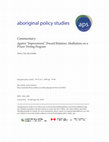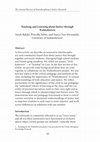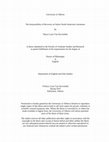Books by Nancy Van Styvendale
Papers by Nancy Van Styvendale

White Benevolence: Racism and Colonial Violence in the Helping Professions. Ed. Gebhard, McLean, & St. Denis, 2022
The chapter discusses the Indigenous prisoner-led "anti-oppression movement" that took place in S... more The chapter discusses the Indigenous prisoner-led "anti-oppression movement" that took place in Saskatchewan during COVID-19, drawing on the influential organizing and writing of the late Cree prisoner justice advocate Cory Cardinal. The chapter focuses on the three hunger strikes that Cardinal mobilized in service of his people's health and well-being, analyzing prisoner hunger striking as a "technique of struggle" (Bargu) against the penal system, a settler-colonial structure designed to remove Indigenous Peoples from their lands, communities, culture and kin. Using two analytics--refusal and relational accountability--the chapter elucidates how Indigenous Prairie prisoner organizing functions both to refuse the lethal violence of the penal system and to enact local Indigenous laws of relational accountability, thus articulating an anti-colonial abolitionist vision of a world beyond prisons grounded in Indigenous sovereignty.
Excerpt from chapter. Purchase book via Fernwood Press: https://fernwoodpublishing.ca/book/white-benevolence
Journal of Prisoners on Prisons, 2022
This article is the discussion resulting from one of two linked Anti-Colonial Abolitionism roundt... more This article is the discussion resulting from one of two linked Anti-Colonial Abolitionism roundtables at the 2021 Native American and Indigenous Studies Association (NAISA) conference. One of the roundtables, which is the concluding piece in the article section of this special issue of the Journal of Prisoners on Prisons, is on anti-colonial abolitionism in a global context – specifically, Canada, Australia, and Aotearoa (New Zealand). The roundtable below focuses on anti-colonial abolitionism in a local context, with the speakers coming from or having connections to one or more of the three Prairie Provinces of Alberta, Saskatchewan and Manitoba, in the land currently known as Canada.

Engaged Scholar Journal, 2019
Our paper analyzes a community service-learning class on Indigenous literatures from the perspect... more Our paper analyzes a community service-learning class on Indigenous literatures from the perspectives of graduate student and instructor. Enacting Jace Weaver's theory of communitism (a portmanteau of "community" and "activism"), the class asks students to read Indigenous texts through the lens of their experiences at community-based organizations in Saskatoon, Saskatchewan, and to consider how these readings shape their interactions with and responsibilities to Indigenous communities. First, the instructor discusses the complexities of community service-learning as an engaged approach to literary study in a settler colonial context. Informed by Tomson Highway's novel Kiss of the Fur Queen, the second author then analyzes their 1 contributions to the social justice club at Oskāyak High School, highlighting Oskāyak's unique academic culture, where music and Indigenous language learning are incorporated into the fabric of everyday life. Ultimately, we argue that a communitist approach to Indigenous literary scholarship creates or furthers relationships with/in and responsibility to Indigenous communities, while encouraging an integrative approach to literary study through critical embodiment.

aboriginal policy studies, 2020
In the following commentary, I offer my thoughts on the Inspired Minds: All Nations Creative Writ... more In the following commentary, I offer my thoughts on the Inspired Minds: All Nations Creative Writing program and its pedagogical and philosophical tenets, contextualizing it in relation to the existing field of arts-based education in prison. Many prison education and arts initiatives articulate their value through the discourse of improvement – in other words, they assume and seek to prove that they contribute to the “improvement” of prisoners, including their self-esteem, behaviour, “pro social” skills, mental health, future job and educational prospects, and, ultimately, their rate of recidivism. My intentionally provocative title – “Against ‘Improvement’” – indicates my interest in problematizing this discourse for the ways in which it locates “need” in the carceral subject, rather than pointing to the inherent violence of the penal industrial complex (PIC) that produces this need in order to justify the system’s existence. Rather than focusing on the need for improvement of criminalized individuals, Inspired Minds turns to the growth and sustenance of good relations as the essential animating force of our collective work. In this way, we orient ourselves toward local Indigenous knowledge, values, and laws that underscore the centrality of good relations to living well.
Journal of Prisoners on Prisons, 2020
Free Lands Free Peoples is an Indigenous-led, anti-colonial penal abolition group. As a collectiv... more Free Lands Free Peoples is an Indigenous-led, anti-colonial penal abolition group. As a collective, we discuss our basis of unity, as well as one specific mutual aid project that we organized in response to the COVID-19 pandemic and the needs of prairie prisoners.
Journal of Prisoners on Prisons, 2020
Annual Review of Interdisciplinary Justice Research, 2019

The essays in the fourth volume of The Annual Review of Interdisciplinary Justice Research reflec... more The essays in the fourth volume of The Annual Review of Interdisciplinary Justice Research reflect upon and examine critically the justice disciplines in Canada. In using this term, we refer to stand-alone postsecondary university degree programs and university research centres that are variously titled criminal justice, justice studies, police studies, as well as related programs such as law and security; indigenous people and law; criminal policy management; human justice; youth justice; community, crime and social justice; justice and public safety; indigenous people and justice and the like. The term ‘justice disciplines’ encompasses several scholarly perspectives that focus on aspects of crime and criminal justice and draws inspiration from John Crank’s (2003) argument that the problematic of justice itself ought to be the unifying concept at the heart of our scholarly endeavors. Thus, no matter what department we find ourselves in, and despite the challenges in defining justice, we are united by a commitment to “a broader, more open-ended investigation into the nature of justice itself” (Crank 2003: 14). We present this collection of essays as an inclusive dialogue on the state of the justice disciplines in Canada, reflecting critically on our collective history while identifying some of the challenges that we face as university educators.
Introduction
Educating Justice: Postsecondary Education in the Justice Disciplines, Steven Kohm, Kelly Gorkoff, Richard Jochelson, and Kevin Walby
Articles
Of Big Tents and Handmaidens: The Origins and Evolution of Criminology at Simon Fraser University, Curt T. Griffiths and Ted Palys
From Correction to Prevention: An Analysis of the Canadian Journal of Criminology and Criminal Justice, 1958-1983, Sean Parys
Commentary: Programs and Centres of Justice Studies in Canada
Development of a Diploma and a Bachelor of Arts Major in Police Studies at Memorial University, Anne Morris and Sharon Barter Trenholm
A Tale of Three Programs: Reflections on Criminological Studies at Ryerson University, Tammy C. Landau and Kimberly N. Varma
From Studies in Justice and Law Enforcement to the Department of Criminal Justice: A Reflection from the University of Winnipeg, Michael Weinrath
A Justice Experience at the University of Regina: A History of an Interdisciplinary, Academic, Liberal Arts Program, Hirsch Greenberg
Personal Reflections on Justice Education at Mount Royal University, Doug King and John Winterdyk
Educating the Criminology Vanguard, R.S. Ratner
Bridging Gaps: Social Justice Studies at the University of Victoria, William K. Carroll
Educating Justice Up Close and From a Distance: Reflections on the First Ten Years of the BA Justice Studies Program at Royal Roads University, Michael G. Young
Reflections on Justice Education
Teaching and Learning about Justice through Wahkohtowin, Sarah Buhler, Priscilla Settee, and Nancy Van Styvendale
Complex Alliances: A Community- and Institution-based Project for Educating Justice-involved Women, Judith Harris and Jaqueline McLeod Rogers
Let Law be Law, and Let us Critique: Teaching Law to Undergraduate Students of Criminal Justice, Richard Jochelson
A Criminologist’s Journey: Embracing the Sociological Roots of Justice Studies, Courtney Waid-Lindberg

Engaged Scholar Journal, 2018
Co-editor Nancy Van Styvendale interviews Joan Kuyek, an Ontario-based social and environmental j... more Co-editor Nancy Van Styvendale interviews Joan Kuyek, an Ontario-based social and environmental justice activist with nearly fifty years of experience as a community organizer and educator. Joan has been involved in a wide range of projects, including Better Beginnings, Better Futures (as Founding Program Coordinator), which develops programming for children and families in a low-income neighbourhood in Sudbury; MiningWatch Canada (as founding National Coordinator), an organization that works with community interests to educate the public about and influence policy on mining practices; and, most recently (as Chair), the GottaGo! campaign seeking action toward a network of
public toilets in Ottawa. She was shortlisted for Samara’s Everyday Political Citizen of the Year (“EPCitizen”) Award in 2015, which nationally recognizes citizens who are participating in Canadian democracy by enriching public life in the country. In addition to her book
Community Organizing: A Holistic Approach (2011), she has contributed a co-authored piece on the Northeastern Ontario Women’s Conference to the collection Changing Lives: Women in Northern Ontario (1996), has authored several digital publications on mining economies and
mining waste, and has also published on the impacts of mining on women’s health in Canadian Woman Studies (Fall 2003/Winter 2004). In 1995, she received an Honourary Doctorate of Social Work from Laurentian University for her community activities. Currently, she teaches at the School of Social Work at Carleton University in Ottawa.
Drawing, in particular, on Joan’s rich history working with universities and researchers on community-based projects, the interview discusses the realities, challenges, and benefits of such community-university partnerships, including the more specific experience of working
with faculty and students involved in community service-learning (CSL).
An introduction to Community Service-Learning in Canada: Emerging Conversations, a special issue ... more An introduction to Community Service-Learning in Canada: Emerging Conversations, a special issue of Engaged Scholar Journal

This paper analyzes interviews with students of an interdisciplinary community-based class in Sas... more This paper analyzes interviews with students of an interdisciplinary community-based class in Saskatoon, Saskatchewan. The class— " Wahkohtowin " (" kinship " in Cree)—brought together university students with youth from Oskayak, an Indigenous High School, and members of STR8 UP, a community-based organization for former gang members. The course centred on the theme of " justice, " and students discussed legal and literary texts related to policing, criminal trials, and prison, and shared their own experiences and stories about justice and injustice. The students described the class as a profound experience of " community, " which caused them to reflect critically upon structures that create and reinforce inequality and estrangement and impact quality of life. This paper describes the class within the larger context of community-engaged pedagogy and Indigenous approaches to community engagement. We explore major interview themes centred on the complexities of creating community in the classroom. Participants discussed encountering " strangers " ; telling and witnessing traumatic stories; unsettling privilege; and enacting resistance and solidarity. Ultimately, the Wahkohtowin class intervenes in dominant models of engaged pedagogy and community-service learning, disrupting notions of a university-community binary, and creating a space where students began to practice solidarity and imagine a quality of life based on equality and justice for all.
A community-based project by men in the Inspired Minds: All Nations Creative Writing program at t... more A community-based project by men in the Inspired Minds: All Nations Creative Writing program at the Saskatoon Correctional Centre. Compiled and edited by N. Van Styvendale.

In this article, we (Sarah Buhler, Priscilla Settee, and Nancy Van Styvendale) describe an innova... more In this article, we (Sarah Buhler, Priscilla Settee, and Nancy Van Styvendale) describe an innovative interdisciplinary and community-based class about justice that brought together university students, Aboriginal high school students and former gang members. We called our project “Wahkohtowin” – or “kinship” in Cree. In the first section of this article, we provide some background about how we came together to collaborate on the Wahkohtowin project. We analyze key aspects of the critical pedagogy and methods of the class, including the importance of “Wahkohtowin” to critical understandings of both education and justice. We reflect particularly on the significance of the circle to our pedagogy; the “embodied” nature of learning in the class; and the centrality of personal narratives, both in their own right and as lenses through which to interpret legal and literary texts. We demonstrate how our pedagogy functioned to form a critical counter-narrative to dominant understandings of justice and to empower students to seek ways to resist injustice and work across differences in solidarity with one another.
Dissertation by Nancy Van Styvendale

Recovery is a ubiquitous theme in Native North American literature, as well as a repeated topic i... more Recovery is a ubiquitous theme in Native North American literature, as well as a repeated topic in the criticism on this literature, but the particulars of its meaning, mechanics, and ideological implications have yet to be explored by critics in any detail. Other than natural/ized telos, what precisely is recovery as it is constructed in Native literature? How might we describe the recovered subject(s) of this literature? To what ends is recovery, as both literary genre and discourse of Native identity, enacted and re-enacted? The Im/possibility of Recovery in Native North American Literatures explores classic and counter recovery narratives, a genre the study coins, and highlights how recovery, defined as "homecoming" by the genre, is characteristically im/possible. Providing in depth readings of four representative recovery narratives, Jeannette Armstrong's Slash, Sherman Alexie's Indian Killer, Tomson Highway's Kiss of the Fur Queen, and Joseph Boyden's Three Day Road, as well as an overall survey of the recovery narrative tradition, Im/possibility argues that recovery is re-formulated through its melancholic introjection of those for whom recovery is impossible. The study is divided into four main sections: the first explores the historical production of recovery as literary tradition in the late 1960s and 70s in the wake of termination and relocation policies in Canada and the United States. The second section brings together trauma theory rooted in Holocaust Studies with indigenous literary articulations of the trauma of displacement to argue that recovery narratives craft a distinctly Native North American understanding of trauma as "trans/historical." The third section turns to the question of agency, re-evaluating the subversive potential of colonial discourses of subjection.











Uploads
Books by Nancy Van Styvendale
Papers by Nancy Van Styvendale
Excerpt from chapter. Purchase book via Fernwood Press: https://fernwoodpublishing.ca/book/white-benevolence
Introduction
Educating Justice: Postsecondary Education in the Justice Disciplines, Steven Kohm, Kelly Gorkoff, Richard Jochelson, and Kevin Walby
Articles
Of Big Tents and Handmaidens: The Origins and Evolution of Criminology at Simon Fraser University, Curt T. Griffiths and Ted Palys
From Correction to Prevention: An Analysis of the Canadian Journal of Criminology and Criminal Justice, 1958-1983, Sean Parys
Commentary: Programs and Centres of Justice Studies in Canada
Development of a Diploma and a Bachelor of Arts Major in Police Studies at Memorial University, Anne Morris and Sharon Barter Trenholm
A Tale of Three Programs: Reflections on Criminological Studies at Ryerson University, Tammy C. Landau and Kimberly N. Varma
From Studies in Justice and Law Enforcement to the Department of Criminal Justice: A Reflection from the University of Winnipeg, Michael Weinrath
A Justice Experience at the University of Regina: A History of an Interdisciplinary, Academic, Liberal Arts Program, Hirsch Greenberg
Personal Reflections on Justice Education at Mount Royal University, Doug King and John Winterdyk
Educating the Criminology Vanguard, R.S. Ratner
Bridging Gaps: Social Justice Studies at the University of Victoria, William K. Carroll
Educating Justice Up Close and From a Distance: Reflections on the First Ten Years of the BA Justice Studies Program at Royal Roads University, Michael G. Young
Reflections on Justice Education
Teaching and Learning about Justice through Wahkohtowin, Sarah Buhler, Priscilla Settee, and Nancy Van Styvendale
Complex Alliances: A Community- and Institution-based Project for Educating Justice-involved Women, Judith Harris and Jaqueline McLeod Rogers
Let Law be Law, and Let us Critique: Teaching Law to Undergraduate Students of Criminal Justice, Richard Jochelson
A Criminologist’s Journey: Embracing the Sociological Roots of Justice Studies, Courtney Waid-Lindberg
public toilets in Ottawa. She was shortlisted for Samara’s Everyday Political Citizen of the Year (“EPCitizen”) Award in 2015, which nationally recognizes citizens who are participating in Canadian democracy by enriching public life in the country. In addition to her book
Community Organizing: A Holistic Approach (2011), she has contributed a co-authored piece on the Northeastern Ontario Women’s Conference to the collection Changing Lives: Women in Northern Ontario (1996), has authored several digital publications on mining economies and
mining waste, and has also published on the impacts of mining on women’s health in Canadian Woman Studies (Fall 2003/Winter 2004). In 1995, she received an Honourary Doctorate of Social Work from Laurentian University for her community activities. Currently, she teaches at the School of Social Work at Carleton University in Ottawa.
Drawing, in particular, on Joan’s rich history working with universities and researchers on community-based projects, the interview discusses the realities, challenges, and benefits of such community-university partnerships, including the more specific experience of working
with faculty and students involved in community service-learning (CSL).
Dissertation by Nancy Van Styvendale
Excerpt from chapter. Purchase book via Fernwood Press: https://fernwoodpublishing.ca/book/white-benevolence
Introduction
Educating Justice: Postsecondary Education in the Justice Disciplines, Steven Kohm, Kelly Gorkoff, Richard Jochelson, and Kevin Walby
Articles
Of Big Tents and Handmaidens: The Origins and Evolution of Criminology at Simon Fraser University, Curt T. Griffiths and Ted Palys
From Correction to Prevention: An Analysis of the Canadian Journal of Criminology and Criminal Justice, 1958-1983, Sean Parys
Commentary: Programs and Centres of Justice Studies in Canada
Development of a Diploma and a Bachelor of Arts Major in Police Studies at Memorial University, Anne Morris and Sharon Barter Trenholm
A Tale of Three Programs: Reflections on Criminological Studies at Ryerson University, Tammy C. Landau and Kimberly N. Varma
From Studies in Justice and Law Enforcement to the Department of Criminal Justice: A Reflection from the University of Winnipeg, Michael Weinrath
A Justice Experience at the University of Regina: A History of an Interdisciplinary, Academic, Liberal Arts Program, Hirsch Greenberg
Personal Reflections on Justice Education at Mount Royal University, Doug King and John Winterdyk
Educating the Criminology Vanguard, R.S. Ratner
Bridging Gaps: Social Justice Studies at the University of Victoria, William K. Carroll
Educating Justice Up Close and From a Distance: Reflections on the First Ten Years of the BA Justice Studies Program at Royal Roads University, Michael G. Young
Reflections on Justice Education
Teaching and Learning about Justice through Wahkohtowin, Sarah Buhler, Priscilla Settee, and Nancy Van Styvendale
Complex Alliances: A Community- and Institution-based Project for Educating Justice-involved Women, Judith Harris and Jaqueline McLeod Rogers
Let Law be Law, and Let us Critique: Teaching Law to Undergraduate Students of Criminal Justice, Richard Jochelson
A Criminologist’s Journey: Embracing the Sociological Roots of Justice Studies, Courtney Waid-Lindberg
public toilets in Ottawa. She was shortlisted for Samara’s Everyday Political Citizen of the Year (“EPCitizen”) Award in 2015, which nationally recognizes citizens who are participating in Canadian democracy by enriching public life in the country. In addition to her book
Community Organizing: A Holistic Approach (2011), she has contributed a co-authored piece on the Northeastern Ontario Women’s Conference to the collection Changing Lives: Women in Northern Ontario (1996), has authored several digital publications on mining economies and
mining waste, and has also published on the impacts of mining on women’s health in Canadian Woman Studies (Fall 2003/Winter 2004). In 1995, she received an Honourary Doctorate of Social Work from Laurentian University for her community activities. Currently, she teaches at the School of Social Work at Carleton University in Ottawa.
Drawing, in particular, on Joan’s rich history working with universities and researchers on community-based projects, the interview discusses the realities, challenges, and benefits of such community-university partnerships, including the more specific experience of working
with faculty and students involved in community service-learning (CSL).